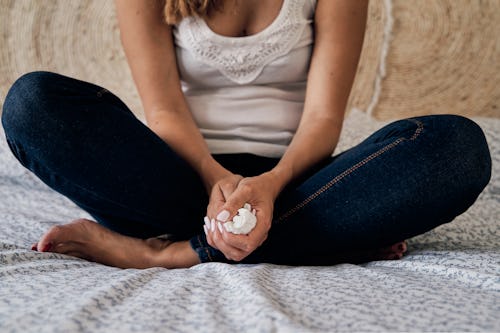
If you have a vagina, then chances are vaginal itching is no mystery to you. What might be an enigma, however, is the intensity of that itching in the evening. So, if you've ever asked yourself, "Why does my vagina itch at night?" you aren't alone. Fortunately, there are ways to soothe your itchy vagina once you figure out what's going on down there.
To learn more about vaginal itching, Romper spoke with Dr. Patrice Harold, MD, Director of Minimally Invasive Gynecology at Detroit Medical Center's Hutzel Women's Hospital, Dr. Lakeisha Richardson, MD, an OB-GYN based in Greenville, Mississippi, and Dr. Sonia Bahlani, MD, an OB-GYN and pelvic pain specialist based in New York City.
What Causes Vaginal Itching At Night?
Unfortunately, according to Harold, a whole host of factors might be responsible for the irritation you're experiencing at night. "Vaginal itching can be internal (vaginal) or external (vulvar, labial or perineal)," she says. "Common causes for external itching can be from contact irritation, like chemicals from soap, detergents, clothing, or infections, such as yeast infections, crabs, or scabies."
Vaginal yeast infections are a common cause of an itchy vagina, according to the Centers for Disease Control and Prevention (CDC), and a reported 1.4 million people go to the doctor each year to treat a yeast infection, which doesn't account for the unknown number of people treating their symptoms at home with over-the-counter remedies. The American College of Obstetricians and Gynecologists (ACOG) warns people with vaginal itching to not always assume it's a yeast infection, though, as similar symptoms could be the result of a dry vagina.

"Some women may suffer from dryness in vaginal and vulvar areas," Harold says. "That can cause itching and irritation as well." Fluctuating hormones might be to blame, according to the ACOG, which means your itchy vagina can get worse during menopause, peri-menopause, breastfeeding, and pregnancy.
As for why your vagina seems more itchy at night, Harold says "things tend to worsen at night because of increased awareness." During the day, we're usually moving around, focusing on other things, and are essentially preoccupied enough to overlook our symptoms. "Once you lie down at night and relax, your senses tend to become heightened," Harold explains.
Simply winding down at the end of the day might not be the only reason why your vagina itches at night, according to Bahlani. "It could be the body's natural circadian rhythm, an increase in inflammation at night, an increase in awareness, less distractions, or a change in temperature and moisture at night."
Does Sex Make Vaginal Itching At Night Worse?
Richardson adds that increased irritation at night may have to do with other bedroom activities, namely sex. "Sex can make symptoms worse. The vaginal tissue is very sensitive and when it is irritated the sensitivity increases," she says. Harold agrees, and says that "sex can also cause friction and worsen the symptoms of itching. It is best avoid sexual intercourse until the cause of the itching is diagnosed and treated."
Sex can worsen your symptoms because it can and often does alter the pH of the vagina, according to Bahlani. If there is less lactobacillus (good bacteria protecting vagina) in your vagina as the result of having sex, you're prone to more infections. Bahlani says that in order to help prevent an itchy vagina, "lubes are super important. Also, protect the pH of the vagina — no douching."
It's also helpful to pay attention to your body and any changes to your routine. "When you begin to have symptoms of vaginal itching or irritation, it's best review your history," Harold says. "Have you changed soaps or bath products, any new laundry detergents, are you wearing more tight fitting clothes? If so, avoid those products or clothing and if there is still no improvement, seek out medical attention."
How Can You Treat Vaginal Itching At Night?
It is safe to use over-the-counter creams externally to relieve itching, according to Richardson. But she also says that while a cream might relieve the symptoms, it will not treat the cause of the itching. "It is still important to follow up with your healthcare provider as soon as possible," she says.

And, the absolute worst thing you can do for an itchy vagina is scratch it, tempting as it is. "Don't scratch," Richardson warns. "Scratching makes the irritation worse and can cause breaks in the skin that increase the risk of secondary bacterial infections."
If you have an itchy vagina there's no need to panic, but it is important to pay attention to your body and consult a physician if necessary. "Remember that, as patients, you know your body best," Bahlani says. "If something seems off, if the itching is unrelenting, lasts over 24-48 hours, or is not helped by over-the-counter meds, I would seek medical attention."
Experts:
Dr. Patrice Harold, MD, Director of Minimally Invasive Gynecology at Detroit Medical Center's Hutzel Women's Hospital
Dr. Lakeisha Richardson, MD, an OB-GYN based in Greenville, Mississippi
Dr. Sonia Bahlani, MD, an OB-GYN and pelvic pain specialist based in New York City

0 comments:
Post a Comment